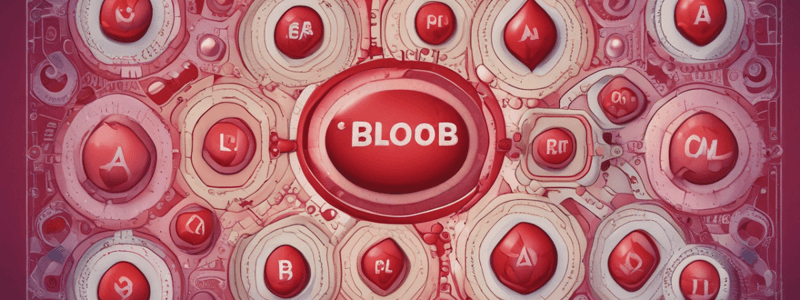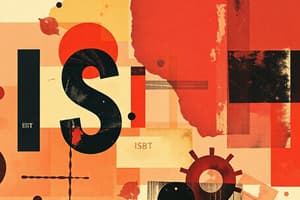Podcast
Questions and Answers
Transfusions transfer blood, or one of the components of blood, from one person to another. For most transfusions it is necessary to match the blood groups of the donor and the recipient, although the use of some blood products, such as clotting factors, may not require matching of blood groups. The mixing of blood types that are incompatible can cause the erythrocytes to clump together, or ______.
Transfusions transfer blood, or one of the components of blood, from one person to another. For most transfusions it is necessary to match the blood groups of the donor and the recipient, although the use of some blood products, such as clotting factors, may not require matching of blood groups. The mixing of blood types that are incompatible can cause the erythrocytes to clump together, or ______.
agglutinate
If the receiver's blood contains, or is able to make, antibodies against the antigens on the donor's red cells, the foreign cells will clump together and ______.
If the receiver's blood contains, or is able to make, antibodies against the antigens on the donor's red cells, the foreign cells will clump together and ______.
disintegrate
It is essential that the blood group of the receiver and donor be the same. The ABO blood group of the donor is always ______ to that of the receiver when transfusions are given.
It is essential that the blood group of the receiver and donor be the same. The ABO blood group of the donor is always ______ to that of the receiver when transfusions are given.
matched
Transfusions transfer blood, or one of the components of blood, from one person to another. For most transfusions it is necessary to match the blood groups of the ______ and the recipient.
Transfusions transfer blood, or one of the components of blood, from one person to another. For most transfusions it is necessary to match the blood groups of the ______ and the recipient.
The mixing of blood types that are incompatible can cause the erythrocytes to ______ together.
The mixing of blood types that are incompatible can cause the erythrocytes to ______ together.
It is essential that the blood group of the receiver and donor be the ______.
It is essential that the blood group of the receiver and donor be the ______.
The ABO blood group of the donor is always matched to that of the receiver when transfusions are ______.
The ABO blood group of the donor is always matched to that of the receiver when transfusions are ______.
For most transfusions it is necessary to match the blood groups of the donor and the recipient, although the use of some blood products, such as ______ factors, may not require matching of blood groups.
For most transfusions it is necessary to match the blood groups of the donor and the recipient, although the use of some blood products, such as ______ factors, may not require matching of blood groups.
The mixing of blood types that are incompatible can cause the erythrocytes to clump together, or ______.
The mixing of blood types that are incompatible can cause the erythrocytes to clump together, or ______.
If the receiver's blood contains, or is able to make, antibodies against the antigens on the donor's red cells, the foreign cells will clump together and ______.
If the receiver's blood contains, or is able to make, antibodies against the antigens on the donor's red cells, the foreign cells will clump together and ______.
Flashcards
Agglutination
Agglutination
The clumping together of red blood cells in a transfusion due to incompatible blood types.
Disintegration
Disintegration
The breakdown or disintegration of a cell, especially red blood cells, in a transfusion due to incompatible blood types.
Transfusion
Transfusion
The process of transferring blood or blood components from one person to another.
Matching blood types
Matching blood types
Signup and view all the flashcards
Clumping of red blood cells
Clumping of red blood cells
Signup and view all the flashcards
Same blood type
Same blood type
Signup and view all the flashcards
Transfusions are given
Transfusions are given
Signup and view all the flashcards
Clotting factors
Clotting factors
Signup and view all the flashcards
Agglutination
Agglutination
Signup and view all the flashcards
Disintegration
Disintegration
Signup and view all the flashcards
Study Notes
Blood Antigens and Antibodies
- A antigen is present on red blood cells of A and AB blood groups, and A antibody is present in plasma of B and O blood groups.
- B antigen is present on red blood cells of B and AB blood groups, and B antibody is present in plasma of A and O blood groups.
- AB blood group has both A and B antigens on red blood cells and neither A nor B antibody in plasma.
- O blood group has neither A nor B antigen on red blood cells and both A and B antibodies in plasma.
Blood Transfusions
- Blood transfusions transfer blood or its components from one person to another.
- Matching blood groups between donor and recipient is necessary to prevent agglutination, except for some blood products like clotting factors.
Agglutination
- Agglutination is the clumping together of erythrocytes due to incompatibility of blood types.
- It occurs when the recipient's blood contains or can produce antibodies against the antigens on the donor's red cells.
Blood Group Matching
- The ABO blood group of the donor must be matched to that of the recipient to prevent agglutination.
- Incompatible blood types can cause the recipient's immune system to react, leading to serious health consequences.
Universal Donor
- Blood group O is considered the universal donor because it has neither A nor B antigen on red blood cells, making it compatible with all ABO blood groups.
Blood Transfusion Importance
- Matching blood groups is crucial to prevent agglutination and ensure safe transfusions.
- Failure to match blood groups can lead to serious health consequences, including death.
Blood Components
- Red cell concentrate is the most commonly transfused part of blood.
- Patients with severe bleeding may receive plasma transfusions to help replace lost blood volume and clotting factors.
Studying That Suits You
Use AI to generate personalized quizzes and flashcards to suit your learning preferences.




